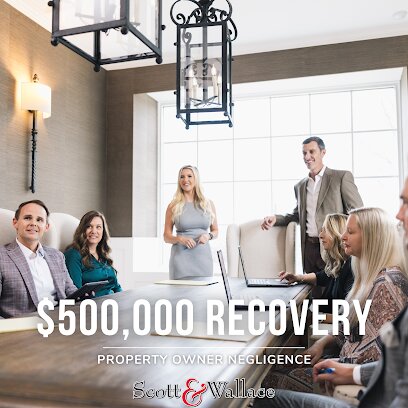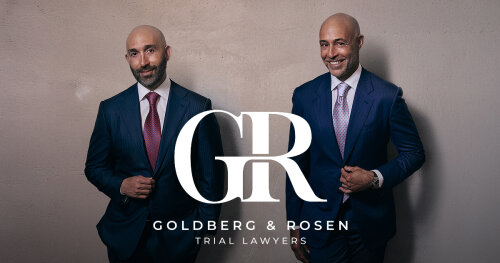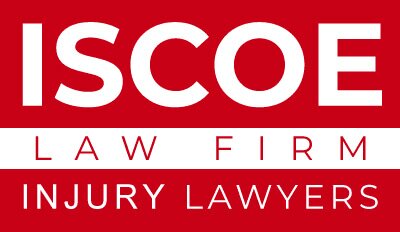Best Insurance Lawyers in Florida
Share your needs with us, get contacted by law firms.
Free. Takes 2 min.
Or refine your search by selecting a city:
List of the best lawyers in Florida, United States
About Insurance Law in Florida, United States
Insurance law in Florida governs the regulation, sale, and administration of various types of insurance policies, including auto, health, homeowner's, life, and commercial insurance. The state has specific requirements that insurance companies and policyholders must comply with, overseen mainly by the Florida Office of Insurance Regulation and the Florida Department of Financial Services. These laws are designed to protect consumers, ensure fair practices in the insurance industry, and provide remedies in case of disputes or company insolvency.
Why You May Need a Lawyer
Many people in Florida seek legal advice regarding insurance due to complex policy language, claim denials, or disputes about coverage amounts. Common situations include:
- Denied or delayed insurance claims
- Disputes over the value of a claim or policy payout
- Unfair settlement offers
- Accusations of insurance fraud
- Determining liability in accidents or property damage
- Issues with insurance company insolvency or bankruptcy
- Bad faith practices by insurers
- Interpreting policy exclusions, endorsements, or riders
An experienced insurance lawyer can help you understand your rights, negotiate with insurers, and represent you in court or arbitration if necessary.
Local Laws Overview
Florida has several state-specific insurance statutes and regulations. Some of the most important aspects include:
- Mandatory insurance: Florida requires certain types of insurance, such as personal injury protection (PIP) for auto insurance and minimum homeowner's coverage for mortgage holders.
- Hurricane and windstorm coverage: Given the state's climate, insurers must offer coverage for windstorms. Special regulations exist for hurricane deductibles and the Florida Hurricane Catastrophe Fund.
- Bad faith insurance laws: Florida law allows policyholders to bring a "bad faith" claim against insurers who unreasonably deny or delay legitimate claims.
- Timelines for claim processing: Insurers are required to acknowledge, process, and pay valid claims within specific timeframes outlined by law.
- Assignment of benefits (AOB): Florida has strict rules about AOBs, especially in property insurance, to prevent abuse related to contractor repairs and claims.
Understanding these statues can be challenging, especially when navigating complex claims or policy language. Consulting a knowledgeable attorney is often the best way to ensure rights are protected and obligations met.
Frequently Asked Questions
What types of insurance are required by law in Florida?
Florida law requires drivers to carry personal injury protection (PIP) and property damage liability (PDL) insurance. Homeowners with a mortgage will generally be required by the lender to carry homeowner's insurance. Flood insurance may also be required in certain locations.
What should I do if my insurance claim is denied?
First, review the denial letter and your policy to understand the reason. You can appeal directly to the insurance company, but if the outcome does not change, consult a qualified insurance lawyer who can help you contest the denial and advise on next steps.
How long does an insurance company have to pay a claim in Florida?
Florida law typically requires insurers to pay or deny a claim within 90 days after receiving a proof-of-loss statement. Longer delays may be grounds for further action.
What is "bad faith" in insurance?
Bad faith occurs when an insurer unreasonably denies, delays, or underpays a legitimate claim. Florida law allows policyholders to seek additional damages if they can prove the insurer acted in bad faith.
Do I need flood insurance if I have homeowner's insurance?
Standard homeowner's insurance policies in Florida generally do not cover flood damage. If you live in a flood-prone area, purchasing a separate flood insurance policy is highly recommended and may be required by your lender.
Can I select my own repair contractor after an insurance claim?
Yes, you generally have the right to choose your own licensed contractor for repairs after a covered loss. Be aware of assignment of benefits (AOB) documents, which may transfer your insurance rights to a third party.
What is the assignment of benefits (AOB) law?
AOB allows parties such as contractors or medical providers to file insurance claims and collect payments directly from the insurer. Florida has enacted laws to prevent abuse of AOBs in property insurance, giving consumers more control and limiting litigation related to claims.
How do I file a complaint against an insurance company in Florida?
You can file a complaint with the Florida Department of Financial Services. They provide an online form and assistance in resolving disputes between consumers and insurers.
What should I do if my insurance company goes bankrupt?
Florida has a state guaranty association that may provide some coverage if your insurer becomes insolvent. Contact the Florida Insurance Guaranty Association for assistance and consult an attorney to help protect your rights.
How can I make sure my policy covers hurricane damage?
Review your homeowner's or property insurance policy carefully. Most policies in Florida automatically include hurricane coverage, but you may have a separate, higher deductible. If you are unsure, consult your insurance agent or a lawyer specializing in insurance law for guidance.
Additional Resources
If you need more information or assistance with insurance issues in Florida, consider reaching out to the following resources:
- Florida Department of Financial Services - Consumer Services Division
- Florida Office of Insurance Regulation
- Florida Insurance Guaranty Association (FIGA)
- National Flood Insurance Program (NFIP)
- Florida Bar Lawyer Referral Service
- Local legal aid societies
Next Steps
If you are facing an insurance dispute or have questions about your coverage, begin by reviewing your policy and gathering all relevant documentation. Contact your insurance company for clarification on your concerns. If the issue is unresolved, consider reaching out to a local insurance lawyer for a consultation. Legal professionals can help you understand your rights, negotiate with insurers, file complaints with state regulators, or represent you in legal proceedings. If cost is a concern, explore local legal aid options or the Florida Bar's lawyer referral service to find an attorney suited to your needs.
Remember that insurance law can be complex, especially following disasters or major claims. Consulting an expert early can help you avoid mistakes and maximize your entitled benefits under Florida law.
Lawzana helps you find the best lawyers and law firms in Florida through a curated and pre-screened list of qualified legal professionals. Our platform offers rankings and detailed profiles of attorneys and law firms, allowing you to compare based on practice areas, including Insurance, experience, and client feedback.
Each profile includes a description of the firm's areas of practice, client reviews, team members and partners, year of establishment, spoken languages, office locations, contact information, social media presence, and any published articles or resources. Most firms on our platform speak English and are experienced in both local and international legal matters.
Get a quote from top-rated law firms in Florida, United States — quickly, securely, and without unnecessary hassle.
Disclaimer:
The information provided on this page is for general informational purposes only and does not constitute legal advice. While we strive to ensure the accuracy and relevance of the content, legal information may change over time, and interpretations of the law can vary. You should always consult with a qualified legal professional for advice specific to your situation.
We disclaim all liability for actions taken or not taken based on the content of this page. If you believe any information is incorrect or outdated, please contact us, and we will review and update it where appropriate.
Browse insurance law firms by service in Florida, United States
Florida, United States Attorneys in related practice areas.
Browse insurance law firms by city in Florida
Refine your search by selecting a city.
















